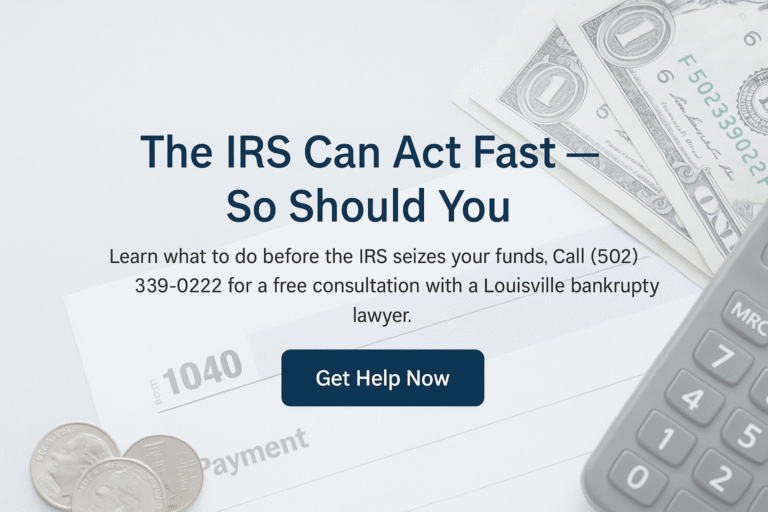The IRS can take money from your bank account to cover unpaid taxes, but this action doesn’t happen without warning. Before seizing funds, the IRS sends multiple notices giving you a chance to pay or make arrangements. Ignoring these notices can lead to a tax levy that freezes and removes money directly from your account.
If you’ve received an IRS notice or already had funds taken, don’t wait to act. Call (502) 339-0222 to speak with an experienced bankruptcy lawyer Louisville residents trust for immediate help with IRS levies and debt relief options.
What Is a Bank Levy?
A bank levy is a tool used by the IRS when you owe unpaid back taxes. They use a levy to seize money from your bank account to pay the funds you owe. When the IRS has sent several notices for payment and you don’t pay or try to make payment arrangements, the IRS may place a levy on your bank account.
Step-by-Step Overview of the IRS Collection and Levy Process
The IRS follows a specific legal process before it can seize money from your bank account. It starts by sending a series of notices about your unpaid taxes, each more urgent than the last. If you ignore these notices, the IRS can issue a Final Notice of Intent to Levy, giving you 30 days to pay or make arrangements before they legally take funds.
| IRS Action | What It Means for You | What You Should Do |
|---|---|---|
| 1. Initial Tax Bill (Notice CP14) | The IRS notifies you of unpaid taxes and begins assessing penalties and interest. | Review the notice, confirm accuracy, and pay or consult a tax attorney. |
| 2. Reminder Notices (CP501, CP503) | The IRS sends follow-up reminders about your increasing debt. | Respond quickly—each notice signals higher urgency. Set up a payment plan or seek legal advice. |
| 3. Final Notice (CP504 / Letter 1058) | Your last warning before levy action. You have 30 days to respond. | Call (502) 339-0222 to speak with a Bankruptcy Lawyer Louisville trusts to help stop the levy and protect your assets. |
| 4. Tax Lien Filed | The IRS places a legal claim on your property or assets. | Act immediately—liens damage credit and complicate financial recovery. Legal help can often remove or prevent them. |
| 5. Bank Levy or Wage Garnishment | The IRS freezes funds or takes money directly from your income or accounts. | Contact a bankruptcy attorney right away to appeal or negotiate a release before further damage occurs. |
Understanding each step in the IRS process helps you act before things escalate. If you’ve received any of these notices, contact O’Bryan Law Offices at (502) 339-0222 to speak with an experienced bankruptcy lawyer Louisville clients rely on to stop IRS levies and protect their financial future.
When Does the IRS Levy a Bank Account?
The IRS will send you repeated notices if you have delinquent taxes. Each letter is usually more serious than the last until you finally receive a Final Notice of Intent to Levy. At this point, the IRS wants to collect your bank account, earnings, or any other property that has enough value to cover your tax owed.
Thirty days must pass after you receive the notice before the IRS can legally take action. You must pay your taxes in full during this time. If you cannot do so, it’s important that you contact the IRS about a payment plan or make alternative arrangements. The IRS has the legal authority to take your assets if you do nothing.
Before the IRS can seize your assets, the following conditions must be met by law:
- The IRS assessed a tax liability and issued a demand for payment notification.
- The taxpayer failed to pay or refused to pay the tax that was due.
- 30 days before the levy, the IRS issued a “Final Notice of Intent to Levy.”
The IRS either mails these notices to your last known address or gives them to you in person at your home or place of business. The levy can happen 30 days after you get your final notice.
Can the IRS Take Money From My Bank Account Without Notice?
The IRS can levy your bank account without giving you a 30-day notice of your right to a hearing in limited instances. This could happen for a variety of reasons:
- The IRS intends to take your state refund.
- The IRS believes that it must act fast to collect the taxes owed.
- A Disqualified Employment Tax Levy was served on you.
What Happens When the IRS Levies Your Bank Account?

The IRS selects which type of levy to use after the 30-day grace period ends, including bank levies and wage garnishments. The grace period begins after you receive the Final Notice of Intent to Levy letter. You have the option to challenge the levy during this time.
The IRS tracks down your bank account if it decides to use a bank levy. The agency may have your financial information from prior tax returns, or it may use your social security number to locate your bank account.
Notice of the intent to levy your account is sent to your bank next. Your bank has to freeze your account or the IRS can hold the bank liable for the taxes you owe. You won’t be able to withdraw the frozen funds from the bank. You’ll have 21 more days at this point to contact the IRS to fix the situation. Your bank sends your money to the IRS on day 22.
However, the IRS only takes the amount of money that was in the account the day it was frozen. Additional deposits can’t be touched unless the IRS issues a new levy. Make a deposit to cover any outstanding checks or automatic payments.
A bank levy is only used by the IRS as a last resort. The IRS took money from my bank account is the harshest means of retrieving unpaid monies from unresponsive taxpayers. It’s much easier for the agency and you to reach an agreement to pay. If you’re facing a levy, you should get advice right away from a bankruptcy attorney and learn how to stop or release an IRS bank levy.
How to Stop an IRS Bank Levy
Even if the IRS has started taking steps to levy your account, you still have options. Acting quickly when you receive a notice from the IRS can pause collection efforts and protect your finances. Depending on your situation, several legal and financial remedies may be available to help resolve your tax problem before it worsens:
- Pay your tax balance in full. This immediately stops further collection activity and clears the levy.
- Request a payment plan. Setting up an installment agreement allows you to pay your debt over time while keeping your account accessible.
- Negotiate a settlement. Through an Offer in Compromise, you may be able to settle your debt for less than the full amount owed.
- File for bankruptcy protection. In many cases, bankruptcy can temporarily or permanently stop IRS collection efforts.
- Ask for a levy release. If the levy creates financial hardship, the IRS may agree to lift it after reviewing your circumstances.
An experienced bankruptcy lawyer Louisville residents trust can guide you through these options and communicate directly with the IRS on your behalf. Taking action early may prevent the IRS from pursuing other property or assets as part of its collection process.
What assets can the IRS legally seize to satisfy tax debts?
The IRS has the legal authority to confiscate almost any asset you own that has value and can be sold for cash. Anything you don’t need for survival or shelter is fair game. This can range from jewelry to your home. Second or vacation homes, retirement accounts, life insurance policies, social security benefits, and other assets are all eligible for seizure or garnishment as well.
You usually have no method of reclaiming your tangible possessions once the IRS seizes them. The IRS wants to pay off the sum you owe as soon as possible, so the products will be sold quickly. The most common method is to hold a public auction. The proceeds from the sale of your assets will be used to pay off your debt.
How Does the IRS Find Your Bank Account?
It’s hard to keep anything secret from the federal government. They will find out if you are receiving pay or have assets in a bank account. And here’s how they do it:
- They get the information from your bank. If your bank pays you interest, this is reported to the IRS annually on form 1099-INT. The name of the bank is also shown on this form. The IRS can use this information to track down your bank and levy your accounts.
- The information can be obtained from your employer. If you work for someone and are paid wages, your employer must file a W-2 Form with the IRS. Your wages can be garnished by the IRS until your debt is paid. This holds true even if you are a contractor. Your clients must disclose the money they pay you and it’s reported on Form 1099-MISC. A quick note: a levy on subcontractor’s pay is only valid for what is owed at the time. It is not constant and ongoing in the same way that a levy on other employees’ salary might be.
- You have previously given this information to the IRS. If you previously paid the IRS with a check, for example, they will keep the financial information you gave with your payment. Similarly, the information you supply the IRS on previous year’s tax returns can be utilized to levy your account.
How often can the IRS levy my bank account?
There is no limit on the number of times the IRS can levy your account. They will most likely continue to levy monies until you come up with a plan to pay your back taxes. It’s worth mentioning, though, that the IRS has a 10-year statute of limitations on debt. So, once the ten years are up, they can no longer deduct money from your account or pay.
How long does it take to remove a levy or wage garnishment?
There are options available to you if the IRS levies your bank account or garnishes your earnings. You may be able to ask the IRS to lift the bank levy by paying your unpaid taxes or entering into an arrangement with them. If you set up a payment plan, the IRS will most likely discharge the levy right away – unless you’ve already been granted a payment extension.
Call the O’Bryan Law Offices Today
Don’t put off taking action until the IRS took money from my bank account. To book a free consultation regarding your situation, call O’Bryan Law Offices immediately. Thousands of families and individuals have relied on our Louisville bankruptcy attorneys to file for bankruptcy, postpone foreclosure, and even stop a bank levy. You have options no matter what your position is. Every client receives personalized treatment and programs, and we can’t wait to begin you on the road to financial recovery. Call us right now at 502-339-0222.
Frequently Asked Questions
Yes, filing for bankruptcy can temporarily stop an IRS bank levy through the automatic stay, which halts most collection actions. Depending on your case, bankruptcy may also reduce or discharge certain tax debts. An experienced Bankruptcy Lawyer Louisville clients rely on can help determine if bankruptcy is the right option for your situation.
Yes. In many cases, you can work directly with the IRS to set up a payment plan or submit an Offer in Compromise. However, having an attorney handle negotiations can protect your rights and often lead to more favorable terms, especially if your tax problem is complex or involves large balances.
Ignoring IRS notices will not make the problem go away. The IRS can escalate its collection efforts by placing a lien on your property or levying your bank account and wages. Taking action as soon as you receive a notice gives you the best chance to protect your assets and resolve your debt before enforcement begins.



